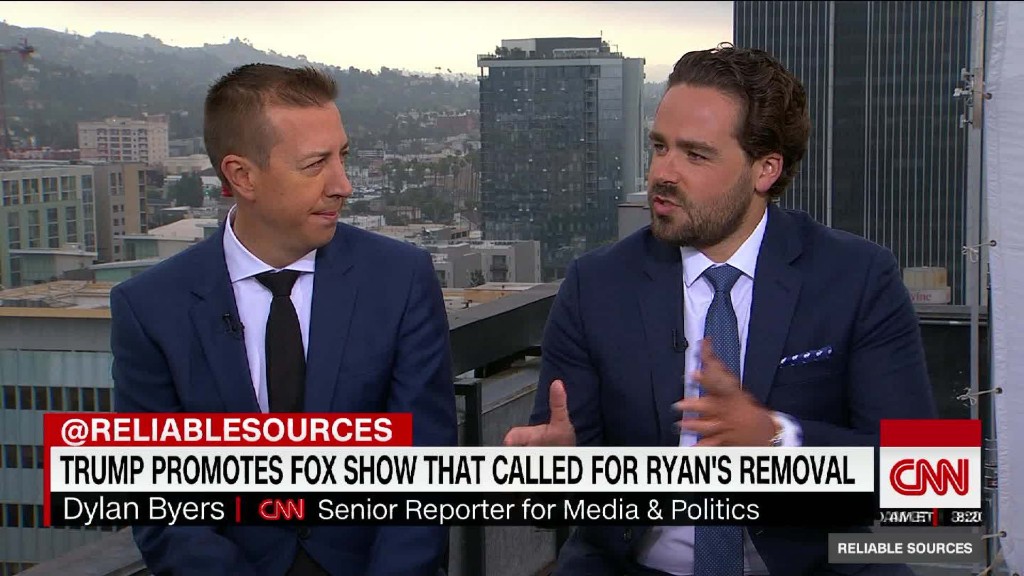
Much of conservative media rallied behind Donald Trump in 2016. Now that he's struggling to live up to some of his promises as president, the relationship is fast becoming more complicated.
President Trump's failure to bring Obamacare repeal legislation to a vote, the sense that his credibility -- including on promises he made to conservatives -- has been diminished, and his waning approval numbers are exposing fissures between and within conservative media outlets that had effectively served as a united front during his bid for the presidency.
The fissures reflect divisions among factions in Trump's own White House, as well as the various factions among Republicans on Capitol Hill. They are exacerbated by the fact that, for the first time in a decade, Republicans control both the White House and the Congress -- leaving conservative critics without a favorite scapegoat: Democrats.
Broadly speaking, there are three groups within conservative media: Populists who were enthusiastic passengers on the Trump train but now appear to be prioritizing their principles over strict allegiance to the president; moderate Republicans and Never-Trumpers who do the same, albeit with a different set of principles; and unabashedly pro-Trump conservatives who for now appear set to defend and promote the president no matter what.
The failure of the American Health Care Act saw populist websites like Breitbart and Lifezette showing a willingness to be critical of the president even as they reserved their heaviest firepower for House Speaker Paul Ryan and establishment Republicans.
"LifeZette is a populist media platform that has its own independent voice, even as it wants the president to be successful," Laura Ingraham, the site's founder and critic of AHCA, told CNNMoney. "[Chief White House strategist] Steve Bannon at CPAC told conservatives to keep the administration true to its promises. That's what I had always planned to do. I took the same approach with Bush Administration."
Meanwhile, establishment conservative outlets that have historically supported Republican presidents, like the Wall Street Journal editorial board and the Weekly Standard, have been critical of Trump since long before he took office.
Between the far-right and the moderate right is Fox News, which has become one of the most aggressively pro-Trump media outlets on offer -- to the point that the president frequently encourages Americans to watch certain shows like "Hannity," "Fox & Friends" and, most recently, "Justice with Judge Jeanine."
Sean Hannity, Trump's biggest cheerleader and defender on television, is not only unapologetic in his defenses of Trump but has even embraced and propagated some of the more conspiratorial ideas to come out of Trump's White House (including the idea of a "deep state" working against Trump and the notion of mainstream media as "propaganda press.")
On "CBS Sunday Morning," veteran journalist Ted Koppel told Hannity he was "bad for America" because he had "attracted people who are determined that ideology is more important than facts."
Fox News has also served as a platform for pundits and analysts whose false reports allow the president to make false claims of his own, then cite the network as evidence. Most infamously, Trump claimed that former President Obama had wiretapped him at Trump Tower. This claim, which came from Fox News analyst Andrew Napolitano, was read aloud by White House Press Secretary Sean Spicer as though it were fact.
When the president was pushed on what evidence he had for the claim during a joint press conference earlier this month, he encouraged the inquiring reporter to "ask Fox." (Napolitano was later taken off air for an undisclosed amount of time.)
Perhaps most significantly, Fox News has provided Americans -- including the president himself -- with a 24-hour news source that ignores developments that may be inconvenient for the president while highlighting stories that support Trump's anti-terror and anti-immigrant rhetoric.
This may provide safe harbor for the president, but the growing restlessness of right-wing populists and enduring criticism of moderate Republicans suggests that conservative media -- like the Republican party -- is at a crossroads.


